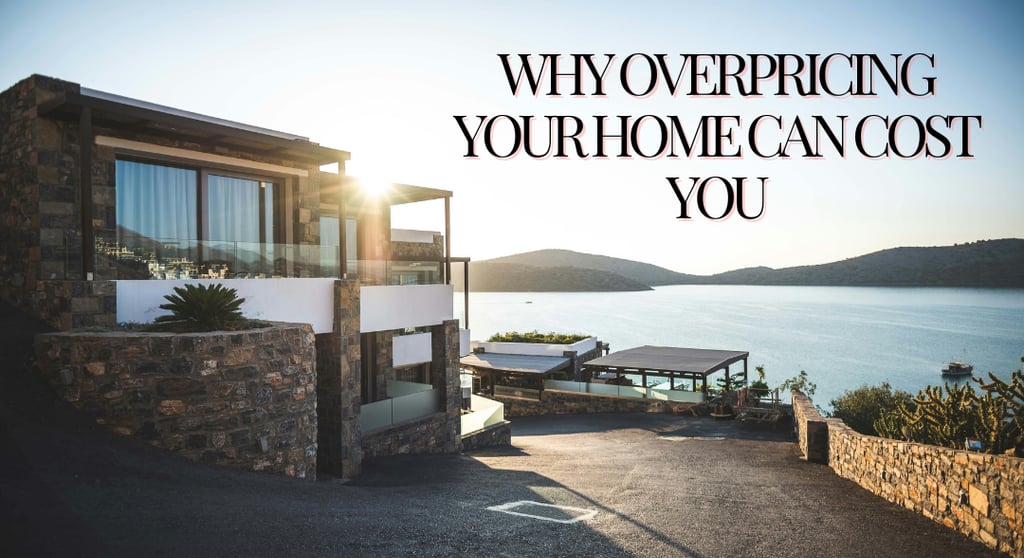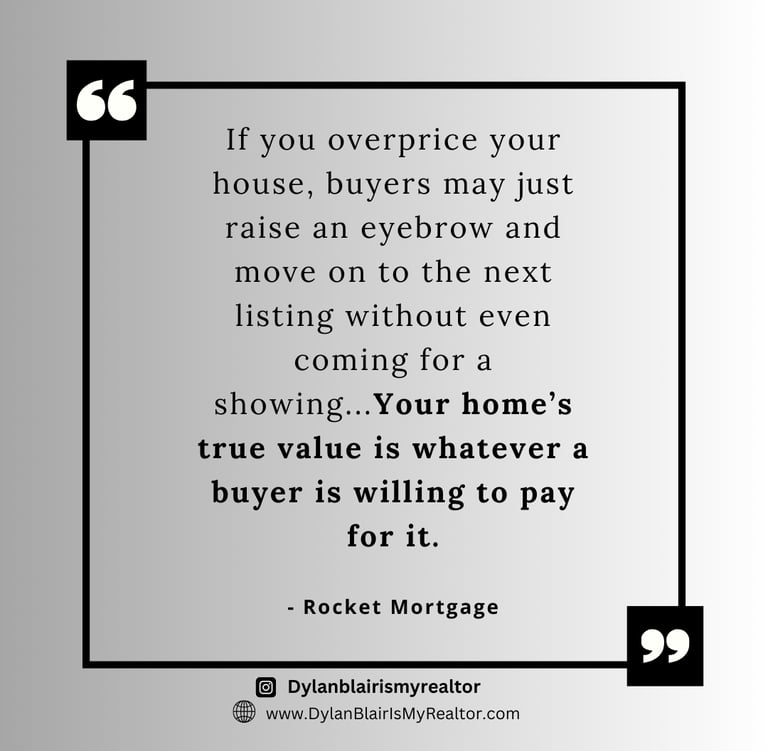Why Overpricing Your Home Can Cost You: Understanding Market Value
Overpricing your home can lead to longer days on the market, fewer offers, and ultimately, a lower sale price. Learn why pricing your home correctly from the start is essential and discover strategies to ensure your listing stands out.
REAL ESTATEBUYERSSELLERSINVESTORS
Dylan Blair
10/3/20243 min read


Why Overpricing Your Home Can Cost You: Understanding Market Value
When it comes to selling a home, setting the right price is crucial. While it might be tempting to list your property at a higher price to leave room for negotiations, this strategy often backfires. Overpricing can turn away potential buyers, prolong your home’s time on the market, and may even result in you receiving less than your home's true value. In this blog post, we’ll explore why accurate pricing is key and how to determine the right listing price to attract serious buyers.
The Pitfalls of Overpricing
Overpricing a home is one of the most common mistakes sellers make. Here’s why it can be costly:
Fewer Showings: When buyers search for homes, they typically have a budget range in mind. If your home is priced significantly above comparable properties, it may not even show up in their searches. This means fewer showings, less interest, and a reduced chance of finding the right buyer.
Prolonged Days on Market: Homes that are overpriced often sit on the market for extended periods. The longer your home stays unsold, the more buyers begin to wonder if something is wrong with it. Properties that linger on the market can develop a “stale” perception, making buyers hesitant to make an offer.
Potential Price Reductions: After a few weeks or months without serious interest, you may need to reduce the price to attract buyers. Price reductions can signal desperation, causing buyers to believe they have more leverage to negotiate a lower offer.
Lower Final Sale Price: Ironically, overpricing your home can lead to selling for less than market value. According to real estate data, homes that experience multiple price reductions typically sell for less than comparable homes that were priced correctly from the start.
Understanding Market Value
Market value is defined as the amount a willing buyer is prepared to pay and a seller is willing to accept for a property. This value is determined not by what the seller wants or needs, but by what comparable homes in the area have recently sold for.
Pricing your home too high, even if only slightly, can lead to a situation where buyers don’t see the value compared to other homes in the same neighborhood. On the other hand, setting your price too low can mean leaving money on the table. The goal is to find the “sweet spot” that will attract buyers while maximizing your return.
How to Determine the Right Price for Your Home
Determining the right price for your home involves several key steps:
Comparative Market Analysis (CMA): A CMA is one of the best tools for determining the right price. It compares your home to similar properties that have recently sold, are currently on the market, or were withdrawn. This analysis takes into account location, square footage, age, and features to find a fair listing price.
Consider Market Conditions: Understanding the current market—whether it’s a buyer’s or seller’s market—can influence your pricing strategy. In a seller’s market with limited inventory, you may be able to price slightly higher. In a buyer’s market, you need to be more competitive.
Leverage an Agent’s Expertise: Working with a knowledgeable real estate agent is invaluable. They can provide insights on local market trends and help you navigate the pricing process with expertise. An experienced agent will not only look at comparable sales but will also consider factors like the time of year, economic conditions, and any upgrades your home has.
Listen to Buyer Feedback: If your home is on the market and not receiving offers or showings, take that as valuable feedback. It could be a sign that your price is too high. Being willing to adjust based on the market’s response is key to getting your home sold.
The Benefits of Pricing Your Home Correctly
When you price your home correctly from the start, you:
Attract More Buyers: A fair listing price generates more interest, leading to more showings and potentially multiple offers.
Sell Faster: Homes priced appropriately tend to sell more quickly, reducing the stress and inconvenience of a long listing period.
Get the Best Price Possible: Proper pricing helps you get closer to your asking price and avoids the need for multiple reductions that can hurt your final sale price.
Conclusion
Pricing your home correctly is both an art and a science. It requires understanding the local market, assessing your property’s unique features, and considering buyer behavior. While it may be tempting to aim high, overpricing your home can be a costly mistake. Instead, focus on setting a competitive price that reflects your home’s true market value. This will help you attract serious buyers, sell quickly, and ultimately achieve the best outcome.
If you’re thinking about selling your home or want more tips on determining the right price, check out my full blog for detailed advice and reach out for a personalized consultation. Let’s make sure your home sells for what it’s truly worth!

